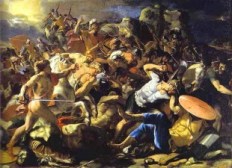"A Witness" -- Joshua 22:1-34
 Wednesday, August 20, 2008 at 09:54AM
Wednesday, August 20, 2008 at 09:54AM  The Seventeenth in a Series of Sermons on Joshua
The Seventeenth in a Series of Sermons on Joshua
According to Joshua, the “LORD gave to Israel all the land that he swore to give to their fathers. . . . Not one word of all the good promises that the LORD had made to the house of Israel had failed; all came to pass.” With these words that chapter in redemptive history known as the Conquest has come to a close. The people of Israel now possess the land of Canaan which YHWH promised to give to his people. God has kept his promise to his people and they now begin to enjoy fully all the blessings of life in that good land flowing with milk and honey. Now that these promises are fulfilled, we move into a new period of biblical history–the time of the Judges. But before we finish up our study of the Book of Joshua, there are a few loose ends to be wrapped up, including a narrowly averted civil war within Israel, Joshua’s farewell to his people and then a covenant renewal ceremony before Joshua’s death.
As we take up the final section of Joshua (chapters 22-24), we turn to Joshua 22 in which Joshua dismisses those two and a half tribes (Reuben, Gad and a portion of the tribe of Manasseh) so that they might return to their homes in that land to the north and east of the Jordan River in what is now the nation of Jordan. In the coming sermons, we will turn to chapters 23-24, where Joshua will remind Israel of all that YHWH had done for them as well as give Israel instructions as to how to live in obedience to YHWH now that they are in Canaan. And then in Joshua 24, Joshua will give final farewell to Israel before Israel’s covenant with YHWH is renewed yet one more time. As we work our way through these final chapters of Joshua, there is a strong sense of reflection upon all those things YHWH has done to fulfill his promise (past and present), as well as instructions for Israel regarding that next chapter in redemptive history–Israel’s future in the land. As such, these chapters take on a certain poignancy as Joshua prepares to die and as we prepare to take up a study of the Book of Judges.
Recall from the opening chapters of Joshua that these same two and a half tribes (Reuben, Gad and half of Manneseh) had contributed at least 40,000 soldiers (cf. Joshua 4:13) to help the other tribes conquer Canaan, land that they would not themselves possess. This was commanded by Moses as a sign of the unity between all twelve tribes, as these tribes would help their brethren gain the promised land. But the inheritance given to these two and a half tribes is in the region known as the Transjordan, which includes that land in Moab where Israel camped before they crossed the Jordan River into Canaan.
Now that Canaan has been occupied by Israel and all the Canaanites have been cast out, and these tribes are dismissed to leave to go back to their homes to the east of the Jordan, the nagging question of their continuing loyalty to other ten and a half tribes remaining in Canaan, as well as their devotion to YHWH becomes a pressing and potentially divisive matter. So much so that a civil war nearly breaks out within Israel over the construction of an altar near the Jordan River. This episode will serve as an important lesson to all of God’s people about the importance of unity as a witness of God’s covenantal faithfulness to those outside the church, as well as an illustration of the need to settle disputes between God’s people in a biblical and God-honoring manner.
We now turn to our text, Joshua 22. As we proceed to work our way through these closing chapters, we will see the focus shift from an emphasis upon God’s fulfillment of his promises to Israel’s need to remain obedient to the covenant God made with Israel at Mount Sinai. This obedience will be the basis for Israel continuing to live in blessing and not come under curse.
To read the rest of the sermon, click here


Reader Comments